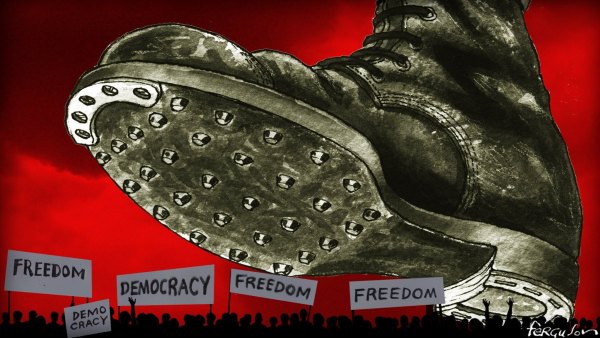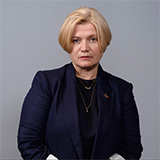Democracy vs. Authoritarianism, or Lessons from the SCO Meeting in China
"In contrast to liberal democracies, authoritarian regimes do not, in practice, acknowledge the equal dignity of their citizens. While they may proclaim such principles in elaborate constitutional texts, the lived reality diverges sharply from these formal declarations."
(Francis Fukuyama, American Philosopher, Political Economist)
On August 31, 2025, a two-day summit of the Shanghai Cooperation Organization (SCO) began in China. At the summit, China and Russia will try to use the SCO as a tool to counter the democratic world and form a new authoritarian world order.

The United States remains the most economically and militarily developed country in Euro-Atlantic civilization. During the Cold War, all the democratic countries of the world united around it as their leader. However, after the end of the Cold War, the world underwent radical changes and adopted new trends and directions of development. Over several decades, one of the poles of the bipolar world, the USSR, could not withstand the strain of economic confrontation and the arms race with the other pole, the United States. This opened up a period of sole world hegemony for Washington. But that time is now in the past.
This period also played a cruel joke on the leaders and leadership of the United States in the democratic world. The false sense of being the "sole victor of the Cold War" affected the entire society of "democratic Atlantis," which, unfortunately, is mostly uninterested in ancient Greek philosophy and is obviously unfamiliar with Plato's works and his instructive story about the fate of a mythical, flourishing country: any monopoly and self-love are destructive to the development of all life on our planet.
Even in democratic countries, the absence of opponents in the form of an opposition in government can lead to stagnation in the development of democracy. The lack of alternatives and external oversight by opponents leads to fatal mistakes in state management and the rise of new tyrants. This also applies to leading states that believe that only their internal national interests matter, rather than ideological or cultural leadership.
The slogan "Make America Great Again" seems attractive to those Americans who do not think about the history of the formation of US power, the laws of world development, and, unfortunately, are already affected by primitive egoism and a lack of systematic thinking.
The leader of the democratic world does not need to excessively care about their own "greatness" in words. They must confirm it not with rhetoric, but with deeds – above all, by successfully implementing the principles and laws of democracy. Their achievements in this regard must surpass those of their opponents. This was the secret of the United States' victory over communist ideology and the communist bloc led by the USSR.
We should also keep in mind that democracy requires constant self-improvement and protection not only from outside but also from within. Adolf Hitler came to power in Germany in a completely democratic way-as a result of free elections. Power was handed over to him by the German people themselves, who believed in his populism and slogans: "Germany for Germans" and "Germany above all."
The objective laws of dialectical development of the world imply that the threat to democracy always exists within democracy itself. As early as the 18th century, one of the founding fathers of the United States and American democracy, John Adams, warned: "Democracy, when it lasts long, can become more bloody than either autocracy or monarchy (forms of government). Remember that democracy never lasts long. It soon wastes, exhausts, and murders itself. There is never a democracy that did not commit suicide."
Considering the historical experience of the development of democracies over two centuries after D. Adams, the conclusion of the great American can be expanded: the threat to any democracy is the risk of its degeneration into temporary anarchy, followed by tyranny. This process becomes inevitable if political elites degenerate, cease to defend democracy from external destructive influences from autocracies, and disregard the laws and principles of democracy within the country.
Unfortunately, the leaders not only of the United States but also of other Western countries failed to take timely steps to formulate objective laws for building, developing, and preserving democracy in the modern world, with due regard for accumulated historical experience and new conditions, when both the internal state of existing democracies and the external environment surrounding them are changing rapidly. They failed to understand the latest trends in global development after 1991 and were therefore unable to predict the possible consequences for democratic countries in a timely manner. As a result, the strategic initiative in the struggle to spread democratic ideas and develop the theory and practice of democracy worldwide was lost.
The theoretical generalization and analysis of the processes of forming and developing existing democracies in the Euro-Atlantic space were not carried out and disseminated in a timely manner. Consequently, the new countries that broke away from the communist camp were left without a ready-made "architectural plan" for building their own democratic systems. This led to distortions and even setbacks in the process of spreading democratic ideas. https://blogs.pravda.com.ua/authors/smeshko/68a5dd747bc1f/
The fact is, the world around us is not comprised solely of democratic states. On the contrary, democratic countries are in the minority on our planet. The nature of these democracies, their culture and philosophy, do not originate from Asia, Africa, or America. This should be remembered first and foremost in the US: the cradle of democracy and its cultural and philosophical foundations have European origins.
With all due respect to the culture and civilizational contribution of our fellow inhabitants of planet Earth who do not belong to democratic societies, their philosophy and culture today are significantly different from those of Europe. Stating this fact is not a sign of arrogance or contempt – they are simply different. The litmus test for this difference is the number of people willing to immigrate to Euro-Atlantic countries compared to those who want to leave in the opposite direction.
The reason lies not only in the higher standard of living and quality of life in Euro-Atlantic countries. The root cause is the difference in cultural, civilizational, and religious tolerance, as well as the level of legal and social protection afforded to citizens, and in ensuring their internal and external security. This is what creates a higher standard of living in these countries.
The difference in the cultural and philosophical traditions of European peoples and those of other, non-democratic countries lies primarily in the mental perception of blood ties, established social castes, ancestral traditions, the role of religion in society, and the authoritarian nature of power. Democracy had no historical roots on continents other than Europe. There is also a difference in the assessment of an individual's life. Only European culture and philosophy recognize its fundamental value and self-sufficiency. In the world surrounding Europe, the value of the individual is secondary to other collective values that are more important to other peoples: "national," "state," or "religious." The philosophical "individuality" of the West still stands in stark contrast to the philosophical "collectivism" of the East.
Compare self-esteem, individuality, and identity among the French, Germans, Italians, Greeks, Scots, and Belgians, in relation to each other, with the sense of collectivity and unity among representatives of the Arab world. For the Swiss, for example, even a common language and ethnic roots with their closest neighbors-the Germans, French, and Italians-are not decisive. The priority is the cultural and philosophical tradition that has historically developed during their coexistence as a state and social life in their own Swiss-style democracy.
On the other hand, consider the Chinese or Hindus. Even while enjoying the benefits of living in Western democracies, they do not renounce their own historical traditions and sense of philosophical and cultural unity with their historical homelands – China or India.
The failure of communist construction and attempts to ideologically unite the peoples of our planet (based on the theory of class equality, the dictatorship of the proletariat, and the elimination of private property) was the result not only of the utopian nature of the ideology itself, but also of the lack of competitiveness of the economic basis of communism. The communist bloc also lost the information war to democracy, whose main weapons were European philosophy and the culture of freedom of speech, legality, and the principle of protecting human rights. These were historically formed in Europe, based on traditions of respect for private property, the rule of law, and the protection of the rights and freedoms of individual citizens who are equal before the law.
It was this philosophy and culture that gave democracy a decisive advantage in economic competition with communist dictatorship, and also led to the rapid implementation of scientific knowledge and advanced technologies in the scientific and technological progress of industrial production. This helped the US become the most economically developed and richest country in the world. The mass emigration of European minds and talents to the United States also played an important role in this. Geography was no less significant: the borders of the United States were protected by two oceans and peaceful neighbors to the north and south. However, with the advent of nuclear weapons in authoritarian countries, this advantage gradually lost its relevance.
The combination of the political superstructure of democracy with the economic foundation of capitalism became a key advantage of democracy over authoritarianism, where a one-party dictatorship was combined with the economic basis of communism. The Cold War between the two opposing systems ended with the collapse of the ideology and practices of orthodox communism. In contrast, the ideology and practices of representative democracy proved capable of successfully adapting capitalism to conditions of fierce competition.
The initial "wild capitalism," which entered into competition with two systems, successfully and evolutionarily transformed itself into modern, "socially responsible capitalism" without revolutions, while preserving and improving various forms of democracy. Incidentally, it also acquired significant elements of socialism. This, in turn, strengthened democracy by expanding its social base, the middle class.
However, after the end of the Cold War and the fall of the Berlin Wall, the borders between the two hostile camps were opened. China and Russia, the two giants of the communist world, adopted not only the economic basis of capitalism from the West, but also the advanced achievements of scientific and technological progress, as well as modern, cutting-edge technologies. They even embellished their authoritarian political superstructures with the camouflage of representative democracy. All this, combined with the new economic basis of 'state capitalism,' offered prospects for economic and military growth, as well as the possibility of emerging from economic crises.
Under the ritualistic, outwardly democratic procedures of elections, they skillfully concealed the old dictatorial essence of power from the population. Under conditions of state control over the media, this was not difficult to do-especially for a society that had never experienced democracy, and where the standard of living and the quality of goods and services had indeed improved compared to the era of orthodox communism. China has retained the hegemony of the Communist Party, while Russia has replaced the role of the "leading and guiding" Communist Party with a parallel vertical of power through the Federal Security Service (FSB).
Meanwhile, Western democracies seem to have frozen in place, "bronzed" by self-admiration and prosperity. Complacently rejoicing in their "victory over communism," they limited themselves to convenient analyses and predictions of world development, which in practice proved to be false. For example, the assertion that "Russia is moving towards democracy" and that Washington will have enough special US-Russian relations to control the entire post-Soviet space through Moscow...
This is just one of the elements that testify to a certain deprofessionalization and degradation of the Western political elites after the end of the Cold War. First of all, in terms of a loss of interest in studying the history, culture, and philosophy of the countries and peoples of the European continent. As a result, there is a lack of reliable analysis and forecasts regarding new threats to democracies in their ongoing war against authoritarianism, which no one has canceled. This war, like the war between good and evil, began long ago and will continue as long as humanity exists.
The phase, active or passive, of the war between democracy and authoritarianism at a specific point in history depends primarily on the strength of the economic, military, diplomatic, and informational components of the forces of democracy. The reason is simple: the very existence of democracy is a threat to the existence of authoritarianism. Therefore, it will always attack first – as soon as it senses that democracy has weakened or that some of its forces have weakened. This attack is primarily provoked by weaknesses in the information sphere. The loss of the strategic initiative by democracy in the information and psychological war against authoritarianism inevitably leads to the initiative passing to its eternal enemy.
A distinctive feature of the current stage of confrontation is that the threat does not come from communist ideas and the communist camp, but from the economically and technologically strengthened camp of authoritarianism, whose countries have strengthened themselves economically and militarily through state capitalism. Several countries in this camp possess nuclear weapons, and there are signs that they are helping others to acquire them. The ideology of this camp is currently not "proletarian unity" but "the struggle against the collective West."
Although in reality, the so-called "collective West" is too slow to respond to the need to become collective and monolithic in confronting the Kremlin's aggression. And the latter's victory in Ukraine will inevitably lead to the fall of democracies like dominoes as a result of further attacks by authoritarian countries on their democratic neighbors.
Блог автора – матеріал, який відображає винятково точку зору автора. Текст блогу не претендує на об'єктивність та всебічність висвітлення теми, яка у ньому піднімається. Редакція "Української правди" не відповідає за достовірність та тлумачення наведеної інформації і виконує винятково роль носія. Точка зору редакції УП може не збігатися з точкою зору автора блогу.






